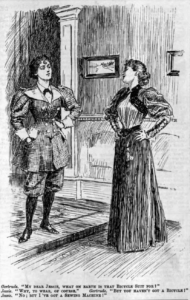
“The Bicycle Suit,” cartoon from Punch, 1895.
“we can make photographs! We have had this studio, with every proper arrangement for light and other things, so that we are not mere amateurs. Why not turn to account the only thing we can do, and start as professional photographers? We should all keep together. It would be a risk, but if we failed we should be very little worse off than before. I know what Lucy thinks of it, already. What have you others to say to it?”
“Oh, Gertrude, need it come to that—to open a shop?” cried Fanny, aghast.
“Fanny, you are behind the age,” said Lucy, hastily. “Don’t you know that it is quite distinguished to keep a shop? That poets sell wall-papers, and first-class honour men sell lamps? That Girton students make bonnets, and are thought none the worse of for doing so?”
“I think it a perfectly splendid idea,” cried Phyllis, sitting up; “we shall be like that good young man in Le Nabab.”
“Indeed, I hope we shall not be like André,” said Gertrude, sitting down by Phyllis on the couch and putting her arm round her, “especially as none of us are likely to write successful tragedies by way of compensation.”
“You two people are getting frivolous,” remarked Lucy, severely, “and there are so many things to consider.”
“First of all,” answered Gertrude, “I want to convince Fanny. Think of all the dull little ways by which women, ladies, are generally reduced to earning their living! But a business—that is so different. It is progressive; a creature capable of growth; the very qualities in which women’s work is dreadfully lacking.” (Levy 9-10).
Amy Levy’s novel The Romance of a Shop can be thought of as proto-feminist at best for its introduction of radical ideas for its time. Women in the 19th century had limited options in improving their class status. Previously, for women to secure a future it was attained through marriage since it was looked down at the time for women to work. Not every woman was afforded the same luck and opportunity to be married thus necessitating an “acceptable” career for women as domestic servants or governess. Levy’s viewpoints can be detected through her introduction to the “New Woman” ideal, a woman who is active in the public sphere and supports herself financially. Although these recently orphaned sisters display radical characteristics in successfully pursuing a hobby in photography to support themselves, they once again return to what is expected of them: marriage.
Gertrude spearheads questions of opening a photography shop to her sisters to financially support themselves. She thinks responsibly and reasons even if they fail, they “should be very little worse off than before” (Levy 9). Gertrude outweighs the possible benefits or consequences and comes to the calculated conclusion any movement forward should be an improvement to their current situation. Fanny, the eldest daughter, laments “need it come to that—to open a shop?” and cries at the thought of being so involved in the public sphere (Levy 9). Fanny acts as an anomaly to her younger, more radical sisters as Fanny is more traditional in her mindset. She symbolizes how women at the time ought to have behaved similarly to their Aunt Caroline who was critical of their modern views on womanhood.
To convince Gertrude’s sister of her new business proposition she argues her ideas are progressive and “all the dull little ways by which woman, ladies, are generally reduced to earn their livings… the very qualities in which women’s work is dreadfully lacking” (Levy 10). Levy utilizes Gertrude to hint at her personal opinions regarding women working and the constraints imposed by society. Opportunities for women to provide for themselves are lacking and Gertrude questions why they should not be allowed to pursue their hobbies to make a living for themselves. The New Woman is to not be confused with the modern woman, this novel only comfortably allows discussion of the emerging new woman and her “masculine” personality for seeking agency and authority. It simply introduces such ideas and though they do succeed in opening a shop, in the end, they all behave as they were originally expected to, which was to seek marriage. Near the end of the novel each sister, disregarding Phyllis’s untimely death, magically ends up in a happy marriage and is well taken care of. Although Lucy continues to work at the shop after marriage the author does not allow either sister to be happy by themselves. They must conform to the expectations of their time to neatly wrap up their story with a bow. This novel allows for the introduction of proto-feminist ideas in its conception but ultimately abides by gender roles applied at the time in ending with submissive wives.
I think you make a critical point that the novel ends in marriage for all (surviving) sisters, despite so much of the storyline focusing on “New Woman” characteristics like running a business. Something that your post made me think about is the fact that Gertrude’s marriage happens at the last moment of the book. That is, it almost seemed like Levy was going to leave her unmarried and lonely, but then she didn’t. Another thing that could be neat to explore would be the fact that not only do all the sisters get married, but they also have children; once again, women get brought back to marital/childbearing roles.
I very much enjoy your point that Gertrude is the mouthpiece through which Levy expresses her own thoughts on how women should move through society. I also observed the way that all the sisters end up married as the default, required “happiness”. The only sister that was not married was Phyllis, as she engaged in scandalous relations with a married man. Given your point that Gertrude’s opinions closely are in line with Levy’s own, I can’t help but to wonder if the reason behind the sisters’ marriages is for the palatability of the audience.